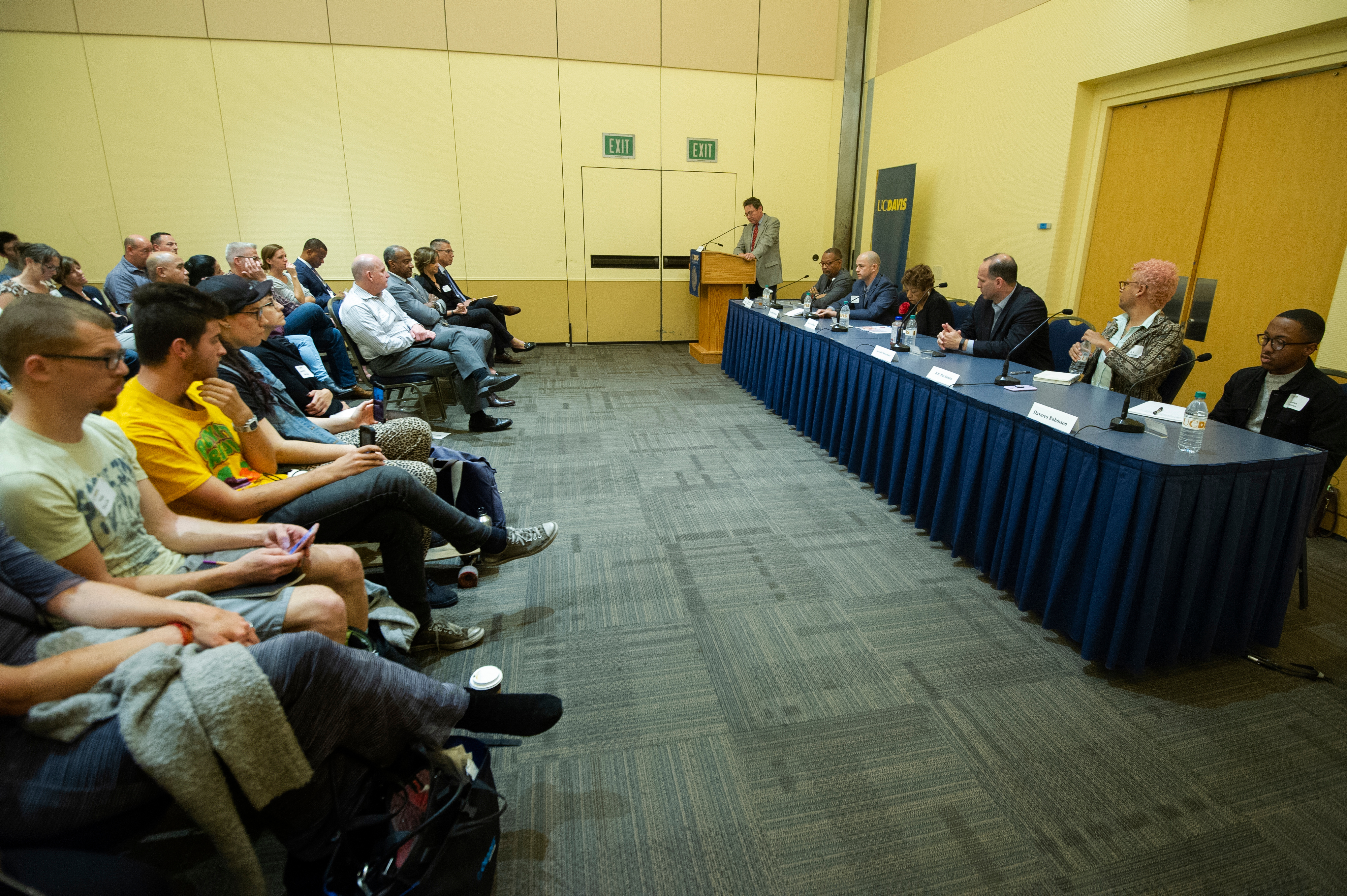
Training, hiring improvements sought as solution for disarmament
A town hall held on Oct. 15 in the Activities and Recreation Center Ballroom discussed a resolution forwarded by the UC Davis Graduate Student Association (GSA) to disarm UC Davis Police. The town hall was initiated by Chancellor Gary May after meeting with GSA members.
The discussion began with a proposal for the disarmament of the UC Davis police and later merged into the topic of police militarization.
On the discussion panel from UC Davis was B.B. Buchanan, a Ph.D. candidate in Sociology and Davares Robinson, a fourth-year political science major. Alex Bustamante, the chief compliance and audit officer for the University of California, Assemblymember Reginald Byron Jones-Sawyer Sr. (D-South Los Angeles), Alice A. Huffman, president of the California Hawaii National Association for the Advancement of Colored People and Woodland Mayor Enrique Fernandez were also present.
The panel was moderated by the UC Davis Law School Dean, Kevin Johnson.
Buchanan explained the GSA’s reasoning for demanding a disarming of campus police.
“The actual incidents in which police intervene in school shootings is relatively rare,” Buchanan said. “Shooting incidents happen relatively quickly.”
Instances of police intervention leading to use of deadly force were cited by Buchanan.
“Scout Schultz at Georgia [Tech] was killed by their campus police while having a mental health crisis,” Buchanan said. “We had a student at Portland State University who was also killed recently. […] The campus officers were not even indicted. These things happen and to argue that somehow we are safer with weapons, I think, is a fallacy.”
Buchanan also discussed the trend of arming police departments with military-grade weapons.
“We’ve seen the proliferation of militarized weaponry and equipment to respond to situations in which police are rarely intervening,” Buchanan said. “I really want to push back on this idea that police militarization equals safety. You can go in with great intentions, but the institution of policing can change what you are allowed to do.”
Huffman offered remarks on what she perceived as the balance between the handling of weapons by police and the preservation of safety within the UC Davis community.
“I think you have to have the kind of police force on campus that respects students, respects individual rights [and] that really care about the diversity that we try to bring onto this campus,” Huffman said. “What I think you need on campus is what you are starting to get with this dialogue.”
Huffman emphasized that bringing military weapons on campus is, in her opinion, unnecessary.
“You certainly don’t need the kind of equipment that you are talking about,” she said. “We fought to get rid of all those tanks and things they are bringing into our community.”
On the other hand, Huffman said she believes that police need certain weapons to keep the campus community safe.
“You can’t tell people to protect you if you don’t give them the tools with which they need to protect you with,” she added.
Jones-Sawyer also spoke on the use of military weapons by the police.
“I can almost guarantee you bringing military vehicles on this campus is not something that is supported by anybody in this [current campus] administration right now,” Jones-Sawyer said. “Everytime I see legislation, it is going from people who want to eliminate military weapons all the way down to pepper spray. We are having that debate in the legislature right now.”
The need to train police officers was highlighted by Jones-Sawyer.
“We have to get to the officers that are here now,” Jones-Sawyer said. “Many of them may have been taught by officers who believe in a way to do things that totally do not fit 2018 and beyond. […] I know what you learned in the academy, I know what the chief told you, I know what is in this manual — throw it away.”
Bustamante added to Jones-Sawyer’s comments by stressing the need for accountability and diversity in the police force as a way to improve policing.
“I think there is a lot of issues [centered] around accountability and identifying the problems in transparency,” Bustamante said. “Identifying those officers who do things that show they should not be wearing a badge [is needed]. I think you are seeing the the state legislature there is a lot of trending now.”
Fernandez then stressed the need to hire the right people for the police force.
“Moving forward, the university should really assess who they are hiring and … allowing to be police officers,” Fernandez said. “I think the university is unique because there is leadership [at the administrative level]. Beyond that, I really think there needs to be effort in looking how we train our officers in de-escalating situations.”
Written by: George Liao — campus@theaggie.org



